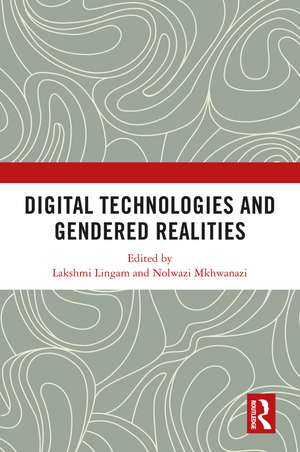Digital Technologies and Gendered Realities
Editat de Lakshmi Lingam, Nolwazi Mkhwanazien Limba Engleză Hardback – 13 sep 2024
A keen reappraisal of the smartphone revolution, the essays underline the constant negotiations between technology and social institutions such as, family, schools, colleges\universities, religious groups, traditional community leaders, media, police, law, and governments. The volume looks at new forms of digital-based surveillance on girls, women and gender minorities and maps the responses of state, civil society and women’s movements in tackling the divergent narratives of freedom versus control; empowerment versus violence. It specifically looks at how concepts of ‘privacy’, ‘agency’, ‘autonomy’ and ‘consent’ are being framed in the legal arena regarding young women, which may or may not be empowering of their agency and choices.
Challenging notions about gender, technology and society, this book will be of great interest to scholars and researchers of sociology and social anthropology, politics, gender studies, and Global South studies.
Preț: 1003.61 lei
Preț vechi: 1223.92 lei
-18% Nou
Puncte Express: 1505
Preț estimativ în valută:
192.05€ • 205.36$ • 160.12£
192.05€ • 205.36$ • 160.12£
Carte tipărită la comandă
Livrare economică 17 aprilie-01 mai
Preluare comenzi: 021 569.72.76
Specificații
ISBN-13: 9780367479695
ISBN-10: 0367479699
Pagini: 264
Ilustrații: 4
Dimensiuni: 156 x 234 mm
Greutate: 0.55 kg
Ediția:1
Editura: Taylor & Francis
Colecția Routledge India
Locul publicării:Oxford, United Kingdom
ISBN-10: 0367479699
Pagini: 264
Ilustrații: 4
Dimensiuni: 156 x 234 mm
Greutate: 0.55 kg
Ediția:1
Editura: Taylor & Francis
Colecția Routledge India
Locul publicării:Oxford, United Kingdom
Public țintă
PostgraduateCuprins
1. Smartphones, Surveillance, Power and Digital Lives: Connecting India and South Africa Part I: Social Media & Digital Apps: Technology of the Self 2. Living the #blessed life: Compensated relationships and social media in Johannesburg 3. Ladies first? How Heterosexual Women Navigate the Gendered World of Online 4. Public Displays of Affection: Experiences of Youth as they Negotiate Private and Public Love 5. Mobility, mediation and multiple men: an exploration of the role of mobile phones in young women’s sexual partnerships and social networks in Khayelitsha, Cape Town Part II: Production of ‘good girls’ within the Context of Disruptive Technologies 6. Mobile phones and "Good Muslim Women": Narratives of young women from the old city of Hyderabad, India 7. “Good girls” and “smart boys”: Mobile Phones and the Social Reproduction of Gender 8. Mobile Phones, Control and Violence: Experiences from Gujarat Part III: Surveillance, Gendered Negotiations and Legal Meanings 9. Young Women’s Engagement with the mobile: Meaning in the family justice world 10. Gendered Surveillance, Family Connections and Conflicts: An Ethnographic Perspective on Mobile Phone Usage by Migrant Brides in North India Part IV: Unpacking ‘Digital Natives’, Policy and Technology-supported Interventions 11. Between Panic and Protection: Children and Young People’s Encounters with Online Pornography 12. Gendered Use of Mobile Technology among Young Children in Urban India: Is there a Difference between the ‘Haves’ and the ‘Have-Less’? 13. Kishor Varta: Using Information Communication Technology (ICT) for changing gender discriminatory social norms among boys and young men in Rajasthan, India
Notă biografică
Lakshmi Lingam was the Dean and Professor of the School of Media and Cultural Studies, Tata Institute of Social Sciences, Mumbai, India, till February 2023, when she superannuated after working at the Institute for nearly 35 years. Currently, she is a Chair Professor with the School of Public Health at the D Y Patil University, Navi Mumbai, India. Lakshmi’s research interests lie in researching gender, employment, health, public policies, social movements, sexualities, social inequalities and digital citizenship.
Nolwazi Mkhwanazi is a Professor of anthropology and Deputy Director of the Centre for the Advancement of Scholarship at the University of Pretoria, South Africa. Nolwazi’s research focuses on youth sexuality, sex education, and sexual health interventions. Her current project is called Reimagining Reproduction: Making Babies, Making Kin and Citizens in Africa.
Nolwazi Mkhwanazi is a Professor of anthropology and Deputy Director of the Centre for the Advancement of Scholarship at the University of Pretoria, South Africa. Nolwazi’s research focuses on youth sexuality, sex education, and sexual health interventions. Her current project is called Reimagining Reproduction: Making Babies, Making Kin and Citizens in Africa.
Descriere
The book explores the varying experiences and engagement of youth with smartphones and digital technologies in India and South Africa. It examines the process of meaning-making (identity construction) garnered through smartphone technology — specifically relating to notions of love, sex, and sexuality.
